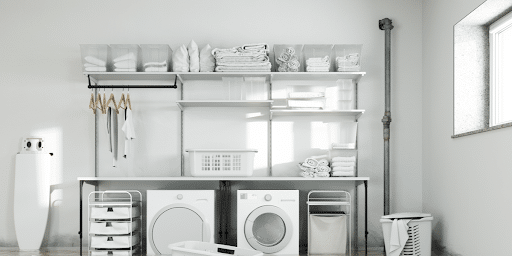
How to Fix a Sewer Backup in the Basement
Published: June 10, 2022 / Last Updated: April 30, 2025
Sewer backups are a common plumbing problem in the summer months due to heavy rain from frequent storms. While many of us are fortunate enough to get through this time of year with dry basements, others are not so lucky.
Learn how to fix a sewer backup in the basement and what causes sewer backups in the first place here!
What Causes Sewer Backups After Storms?
June and July are the wettest months for Washington D.C. residents. The average precipitation is 4.20 inches in June and 4.33 inches in July. Heavy rains from summer storms result in a ton of water runoff, which can overwhelm both the storm sewers and the sanitary sewers.
When the city’s main sewer system can’t efficiently transport the rising groundwater, it will back up into private sewer lines, eventually flooding your basement. Any debris or grease buildup in your sewer pipes will exacerbate this problem.
Heavy rain not only causes sewer backups after a storm — it also causes plumbing problems down the road. More rainwater in the sewer system will attract tree roots. These roots can pierce the pipes as they seek out water and nutrients found in sewage. As they grow larger, they can block the flow of water. And when wastewater has nowhere to go, it will return back to your home.
Signs of Sewer Clogs and Backups
Now that you know what causes sewer backups, learn how to spot one before it causes a plumbing disaster in your home. If you notice any of the following signs, call one of your trusted plumbing companies in D.C. as soon as possible!
- You hear gurgling sounds coming from your drains. Clogs in the sewer pipes prevent water from flowing freely, which can lead to trapped air or gas bubbles.
- You smell rotten eggs or sewage coming from your sink, shower, or other drains. This is caused by sewer gases or bacteria.
- Multiple plumbing fixtures in your home are draining slowly. More often than not, multiple clogged drain lines point to a sewer problem.
- Water is backing up in your shower or tub, or there is standing water near your basement floor drains. When your sewer drain can’t handle any more wastewater, it will send it back to your home.
How to Fix a Sewer Backup in the Basement
A sewage backup isn’t just a smelly mess you have to clean up; it can cause serious harm to you and your family’s health if not dealt with quickly. So, how do you fix a sewer backup in the basement? Call a professional!
Wastewater falls into two categories: greywater and blackwater. Greywater refers to water used for cleaning, whereas blackwater is any waste from toilets or urinals. As you can imagine, cleaning this up is not as simple as mopping the floor. Unless the water damage is fairly minimal, we recommend bringing in professionals.
In the meantime, if you have to walk through your flooded basement to turn off the electricity or water supply, wear protective gear!
Consider scheduling a basement drain cleaning to prevent sewer backups caused by heavy rain in the future.
Can You Sue the City for a Sewer Backup?
In severe cases, your basement may flood, and everything from your washing machine to the storage items will be ruined. Most homeowners insurance does not cover flooding caused by natural events. To repair the water damage and replace the broken appliances, do you have to pay out of pocket, or can you sue the city for a sewer backup?
In short, it depends on the severity of the property damage and whether you can prove that the city failed to provide adequate maintenance services that resulted in a sewer backup.
Contact Magnolia for All Your Sewer Problems
Whether your sump pump fails right before a big storm or you’re not sure how to fix a sewer backup in the basement on your own, don’t fret! Magnolia Companies has been around since the 1950s, and the first service we offered is plumbing in Washington D.C. and the surrounding areas. We hold ourselves to the highest standards for both residential and commercial plumbing services, so you know you’re working with the best in the business when you choose us. Contact us to learn more or schedule an appointment!
Share This Article:
Request An Estimate
Contact us for a free estimate. It's just one form or phone call away!
Join Our Newsletter
Submit your email to receive promotions.
